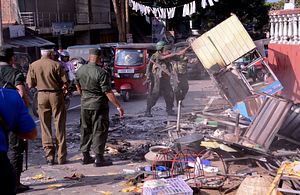On Monday, the Sri Lankan government declared a 10-day state of emergency—the first since the civil war ended in 2009—following clashes between Muslims and Buddhists on Sunday. This latest clash took place in Kandy, a tourist city in the center of island, after a Sinhalese truck driver succumbed to his injuries following a non-racial altercation with some Muslim youth. Hardline Buddhist monks arrived in Kandy allegedly to pay their respects, but Sri Lankan authorities believe they were there to incite violence, as they have done in the past.
This fresh wave of communal violence has the potential to derail an already unsteady reconciliation process, unless the Sri Lankan government takes active measures to increase the public’s faith—specifically the Tamil and Muslim communities’ views—in its political system and law enforcement agencies. Actions must include preventing police brutality by reforming the draconian Prevention of Terrorism Act (PTA) and using its current hate speech legislation to legally targeting militant Buddhist monks from inciting violence.
Sri Lanka is recovering from 30 years of civil war. From 1983 to 2009, Tamil separatists fought to establish an independent state in the north and east of the island, killing approximately 40,000 people—not including victims of enforced disappearances. Sri Lanka’s Muslim community, which is about 10 percent of the population, opposed the Tamil separatist movement, creating a rivalry between the two minority communities. Tamil rebels routinely targeted Muslims during the war, evicting over 60,000 Muslims from the Northern Province. The Tamil defeat in 2009, and consequently the end of the war, has resulted in a period of triumphalism, where militant Buddhist groups like Bodu Bala Sena (Buddhist Power Force or BBS), formed in 2012, have pushed an anti-Muslim agenda, fueling the divide—a trend that is evident in Myanmar.
In the meantime, the government of Sri Lanka has been more focused on short-term political gains rather than advancing a much-needed post-conflict reconciliation process. For example, President Maithripala Sirisena’s administration has been slow in developing confidence-building measures to reduce ethnic tensions with Tamils and setting up a system for transitional justice. Reforms to the PTA have fallen short, and preventive detentions continue unabated.
While Prime Minister Ranil Wickremesinghe immediately denounced the violence, stating that an investigation has already been launched to ensure justice, Mano Ganesan, the Sri Lankan minister for co-existence, believes that state of emergency has also widened police powers to detain suspects. While mounting religious violence has been a cause of concern for some time, Sri Lanka’s inability to halt Buddhist extremism has now brought it to a boiling point.
Denouncing the attacks amounts to empty rhetoric. Instead, the Sri Lanka government must focus on a post-conflict reconciliation plan that involves setting up transparent accountability processes to deal with war crimes committed by both Tamil separatists and the government. Furthermore, the PTA must be reformed to control the police and consequently prevent human rights abuses like torture and unwarranted detentions. While debates on how to implement Sri Lanka’s hate speech laws are useful, using international legal standards against hardline Buddhist monks is a practical approach to prevent incidents, like the one in Kandy, from becoming national events that encourage ethnic and religious cleavages.
At this point, the Sri Lankan government is seen as appeasing hardline Buddhist groups or lacking a political will to protect its minorities. Both views do not bode well for a peaceful Sri Lanka.
Sahar Khan is a visiting research fellow in the Defense and Foreign Policy Studies program at the Cato Institute.
































